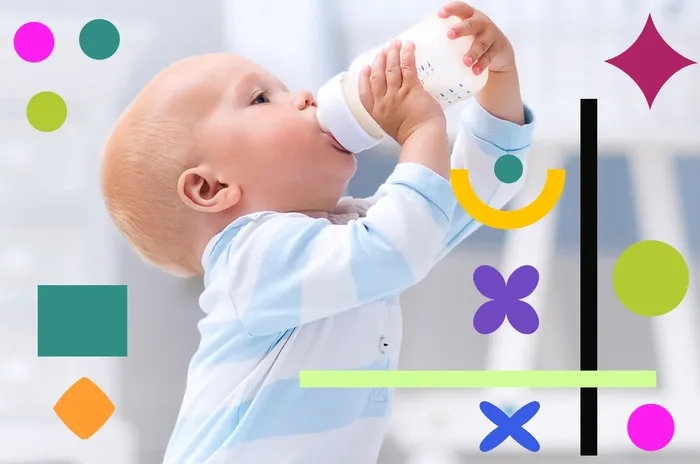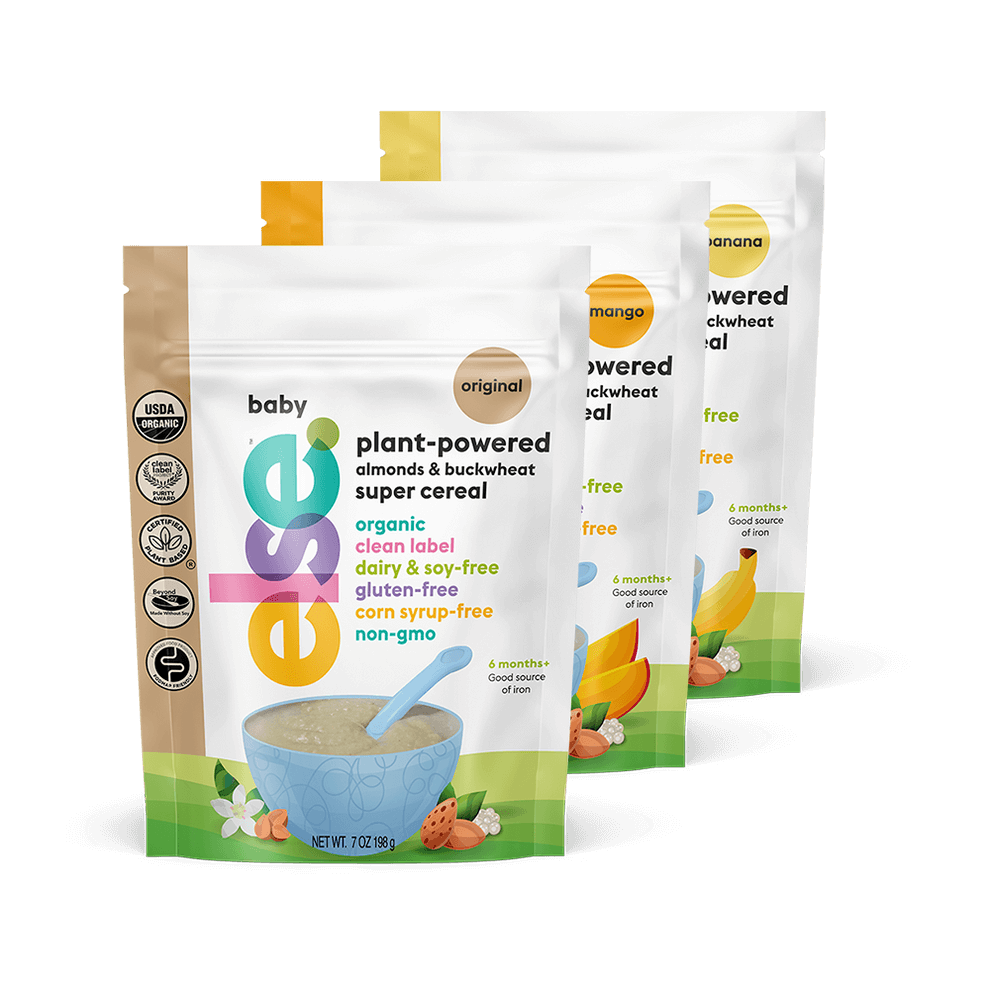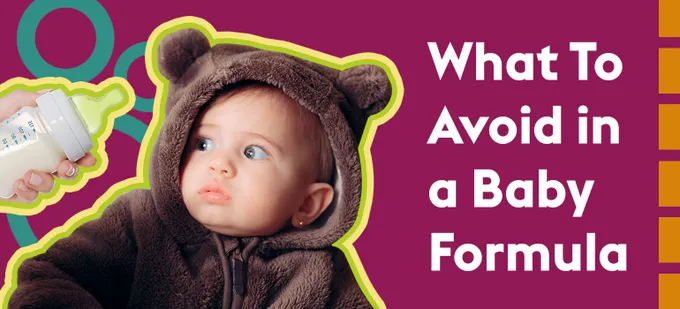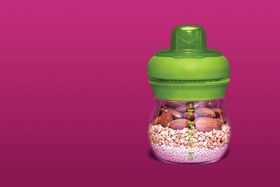What to Look For in a Soy Free Baby Formula
Learn more about the importance of soy-free baby formula and its nutritious advantages.
Updated April 26, 2024

Breastfeeding is often touted as the gold standard for infant nutrition, but it isn't always a viable or sustainable option for everyone. As a parent, you should never feel guilt or shame if you decide that formula is the best choice for your baby. Thankfully, there are fantastic formulas available designed to mirror the nutritional density of breastmilk as closely as possible. However, not all formulas are created equal; some contain synthetic, genetically modified, or low-quality ingredients.
Most baby formulas are based on either animal milk protein or soy protein. If you're aware of the concerns about soy in baby formula and are seeking alternatives, you might be interested in soy-free options. We've compiled a list of what to look for in a soy formula, answering the question "Is soy-free formula good for babies?" This will help you understand the ingredients you want in your baby's formula and those to avoid.
Exploring Vegan Formula Options for Your Baby's Nutrition
Vegan baby formula is another excellent alternative, with products like the Pea Protein Formula and Vegan Toddler Formula gaining popularity. These formulas use plant-based proteins, offering a balance of nutrition without the use of animal-derived ingredients.
However, it's important to note that while these are some of the best soy-free formulas, your baby's needs may vary. Always consult a doctor before changing or switching your baby's formula. The main concern with soy is its potential allergenic properties, so if you're considering a milk-based formula or using milk instead of formula, ensure to discuss this with your healthcare provider first.
Regardless of whether you choose breastmilk or formula, the goal is to provide your baby with the nutrients they need for healthy growth and development. With careful consideration and guidance from a healthcare professional, you can find a formula that best suits your baby's needs.
Note: When looking for the best soy-free baby formula available in the US, consider options like Sprout Organic’s Infant Formula and Baby’s Only Organic. Both are highly regarded for their formula composition. These products are dairy-free baby formulas that use organic pea protein and organic rice protein instead of soy lecithin.
Soy-free Infant Formula Options
When exploring soy-free infant formula options, there are several alternatives available. Predominantly, the formula is made from cow's proteins, but there are also other options such as goat's milk formulas and protein hydrolysate formulas. In addition, a handful of plant-based formulas are also present in the market. This guide will help you understand if opting for a soy-free formula is the right choice for your baby.
It's essential to understand the dietary needs of your baby before making a decision. If you're on a quest to avoid soy, numerous alternatives can cater to your baby needs. For instance, an organic goat milk formula can be an excellent option, offering similar nutritional benefits without the potential allergens present in soy.
Dairy-Free Formula
For parents seeking dairy-free alternatives, a variety of dairy free baby formula options are available. These can be a good fit for babies with lactose intolerance or milk protein allergies. However, it's worth noting that some of these formulas may still contain organic soy lecithin, which is often used as an emulsifier. Plant-based formulas are newer to the market, but can provide a cleaner, dairy-free, and soy-free alternative.
Else Nutrition's complete nutrition drink for toddlers is made from almonds, buckwheat, and tapioca. They are non-dairy formulas and only feed your babies with the best ingredients to promote growth and development.
Protein Hydrolysate Formula
Protein hydrolysate formulas are another alternative. These are designed for babies who have difficulty digesting regular cow's milk proteins. The protein in these formulas has been broken down into smaller parts, making it easier for the baby's digestive system to process. These formulas can be very expensive and have a strong odor. This is good for little ones who suffer from food allergies and need a hypoallergenic formula.
If you live in the US, you'll find a broad range of soy-free formula in the US market. Some of these are even suitable for toddlers, offering a seamless transition from infant formula to a formula intended for toddlers.
»Discover if choosing one of these soy-free formula options is right for your baby.
Cow’s Milk Formula
Cow’s milk based formula for babies is the most abundant kind on the market. However, a cow’s milk allergy is one of the most common allergies in infants. Infants can also have a lactose intolerance, which may cause complications when consuming cow milk protein. While it only affects 2-3% of all babies, the symptoms can be serious. If your child doesn’t suffer from a cow’s milk allergy, and you’re not averse to animal products, this type of infant formula may be right for your child. This is not a hypoallergenic formula since so many children are allergic but it is without soy.
Goat’s Milk Formula
Goat’s milk more closely resembles breast milk than cow’s milk so many families who choose to avoid traditional dairy products because of the hormones and antibiotics often consumed by cows opt for goat’s milk formula. However, goat’s milk contains only slightly less lactose than cow’s milk and many of the same proteins that can cause allergic reactions. For babies with a severe sensitivity to lactose or a cow’s milk allergy, goat’s milk can still trigger unpleasant symptoms.
What To Look For in a Baby Formula
If you walk the baby formula aisle at any grocery store, you will see most of these baby formula options. The multitude of formulas and the clever marketing tactics of the companies that sell them make it difficult to determine what one is right for your child. This is why we have put together a list of everything that is important in a soy free formula.
Proper Nutrition
Every mother’s fear when switching from breastmilk to formula is that their child won’t receive the nutrients they need. The first year of your child’s life is a time of rapid growth and development, so it’s crucial that the formula you feed them provides the right nutrition to support this growth. Your child will require high levels of carbohydrates and fats, and some protein during their first year of life. These three macronutrients form the foundation of all infant formulas, whether they’re derived from cow’s milk, goat’s milk, or plants.
Thankfully, baby formula is highly regulated by the Food and Drug Administration (FDA) to ensure it provides the right nutrition. The FDA has set specific ranges for the necessary macronutrients protein, fat, and carbohydrate and minimum requirement concentrations of 29 essential nutrients for baby formula. There are many brands of formula for toddlers that contain the complete nutrition for toddlers. The type of formula you choose can be organic infant formula, vegan infant formula, plant-based infant formula or regular toddler formula.
Whole Food Ingredients
Adequate amounts of protein, fat, and carbohydrates can be derived from a variety of sources, not all of which are good for your child. The best for any baby is more whole food ingredients. When whole foods are the primary source of macronutrients in a formula, instead of isolated parts, artificial processing methods and harsh chemicals can be avoided. Additionally, vitamins and minerals are more abundant and demonstrate increased health benefits when consumed as part of a whole food, rather than from its isolated components. While the baby formulas you’re looking at may boast complicated and lengthy ingredient labels, dissecting them is important if you want to provide the purest nutrition to your child. When possible, choose the option with the most whole food ingredients and avoid any synthetic ingredients. There are organic products that contain complete nutrition formulas in the U.S. such as Else Nutrition. Many baby products that are organic fed is best for children with sensitive tummies or for parents who have concerns about what their children are being formula fed.
Certified Organic
Many typical baby formulas are made with synthetic and/or genetically modified ingredients. When you choose an organic formula, you can largely eliminate the risk of both synthetic ingredients and GMOs. However, just because an ingredient is organic, doesn’t mean it’s healthy. While paying attention to the “certified organic” label will help you hone in on the better baby formulas out there, you still have to pay close attention to the ingredient labels to ensure those organic ingredients are safe for you child. The clean label certification means it is the best organic baby formula on the market. If you are raising a vegan baby, you would want to make sure that it has the clean label certification. Certified organic is much healthier compared to cow's milk formula and Else nutrition plant based infant formula
Vitamins A & D
Certain vitamins are particularly important for infants to obtain in their first year of life. These include vitamins A and D, which support bone and immune health, growth, and nervous system development. As you look for these essential vitamins on the list of ingredients, be sure to avoid formulas that are 'enriched' with Vitamin A (or DHA) as these formulas often include synthetic forms of the vitamins.
What To Avoid in Baby Formula Options
Knowing what to look for in a baby formula to ensure it is safe is only half the battle. Next, consider what to avoid. Sometimes it's easier to look for red flags on ingredient labels than to determine what whole foods and vitamins are present and if ingredients are organic. These are the big no-nos in non-soy baby formulas.
GMOs
While the effects of genetically modified ingredients are unknown, the potential of harm may not be worth the risk for your infant. Any ingredients that are genetically modified have altered chemistry that could disrupt your child’s sensitive systems and cause digestive issues, altered immune function, poor neurological development, and more. Thankfully, any products including baby formula that contain GMOs must say so right on the product packaging, so you can easily separate formulas that contain genetically modified ingredients from those that don’t.
Oils
Baby formula will typically contain a blend of several vegetable oils because these blends mimic the fatty acids found in breast milk. However some of these oils should be avoided as they are unhealthy for anyone, especially infants, to consume. These red flag oils include high oleic safflower oil, soybean oil, and palm oil. Many are highly processed with contaminants, come from GMO sources, and can’t be properly digested.
Heavy Metals
Unfortunately, many popular baby formulas have been found to contain toxic amounts of aluminum. Heavy metals such as aluminum can increase the risk of neurological diseases and lead to reduced renal function and reduced bone mineralization in preterm babies. Unfortunately, the only way to know if a formula contains aluminum is to research whether or not it has been tested and found free from heavy metals.
A Safe Plant-Based and Soy free Baby Formula
For a safe, plant-based non-soy formula without soy oil, look to Else. Else products are different from other non-soy formulas on the market in several ways. While most infant formulas are either dairy or soy-based, Else is vegan, non-dairy, and soy-free. It is 100% organic, free of hormones, antibiotics, artificial colorings, corn syrup and flavors, and GMOs.
Else baby formula meets the complete nutritional requirements of your child for proper growth and development, is organic, and made from whole ingredients. All of the protein, fat, and carbohydrates found in Else formula are obtained directly from the whole plants of almonds, buckwheat, and tapioca, and there are no harmful oils or synthetic ingredients.
For parents looking to feed their toddler a nutritiously rich, plant-based formula that meets all their needs after the first year of life, Else’s Toddler Formula is a safe, soy-free option.
For every formula you consider, understanding the ingredients and the brand’s philosophy will require a bit of research but will ensure you can feed your child your formula of choice with confidence.
The content and advice provided in this article is for informational purposes only and is not a substitute for medical diagnosis, treatment, advice for specific medical conditions. Always consult a pediatrician to understand the individual needs of your child.











